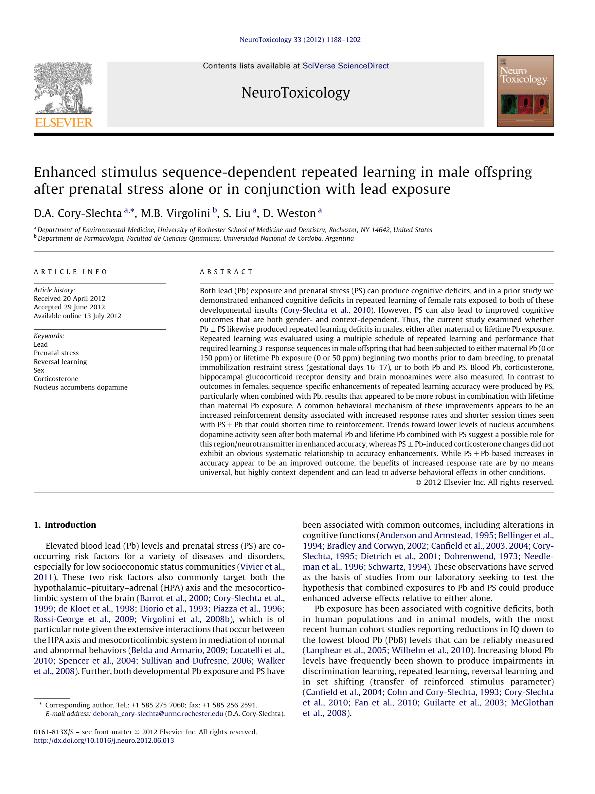Mostrar el registro sencillo del ítem
dc.contributor.author
Cory Slechta, D. A.
dc.contributor.author
Virgolini, Miriam Beatriz

dc.contributor.author
Liu, S.
dc.contributor.author
Weston, D.
dc.date.available
2023-03-16T18:49:19Z
dc.date.issued
2012-07
dc.identifier.citation
Cory Slechta, D. A.; Virgolini, Miriam Beatriz; Liu, S.; Weston, D.; Enhanced Context-Dependent Repeated Learning in Male Offspring After Prenatal Stress Alone or in Conjunction with Lead Exposure; Elsevier Science; Neurotoxicology; 33; 5; 7-2012; 1188-1202
dc.identifier.issn
0161-813X
dc.identifier.uri
http://hdl.handle.net/11336/190826
dc.description.abstract
Both lead (Pb) exposure and prenatal stress (PS) can produce cognitive deficits, and in a prior study we demonstrated enhanced cognitive deficits in repeated learning of female rats exposed to both of these developmental insults (Cory-Slechta et al., 2010). However, PS can also lead to improved cognitive outcomes that are both gender- and context-dependent. Thus, the current study examined whether Pb ± PS likewise produced repeated learning deficits in males, either after maternal or lifetime Pb exposure. Repeated learning was evaluated using a multiple schedule of repeated learning and performance that required learning 3-response sequences in male offspring that had been subjected to either maternal Pb (0 or 150. ppm) or lifetime Pb exposure (0 or 50. ppm) beginning two months prior to dam breeding, to prenatal immobilization restraint stress (gestational days 16-17), or to both Pb and PS. Blood Pb, corticosterone, hippocampal glucocorticoid receptor density and brain monoamines were also measured. In contrast to outcomes in females, sequence-specific enhancements of repeated learning accuracy were produced by PS, particularly when combined with Pb, results that appeared to be more robust in combination with lifetime than maternal Pb exposure. A common behavioral mechanism of these improvements appears to be an increased reinforcement density associated with increased response rates and shorter session times seen with PS ± Pb that could shorten time to reinforcement. Trends toward lower levels of nucleus accumbens dopamine activity seen after both maternal Pb and lifetime Pb combined with PS suggest a possible role for this region/neurotransmitter in enhanced accuracy, whereas PS ± Pb-induced corticosterone changes did not exhibit an obvious systematic relationship to accuracy enhancements. While PS ± Pb-based increases in accuracy appear to be an improved outcome, the benefits of increased response rate are by no means universal, but highly context-dependent and can lead to adverse behavioral effects in other conditions. © 2012 Elsevier Inc.
dc.format
application/pdf
dc.language.iso
eng
dc.publisher
Elsevier Science

dc.rights
info:eu-repo/semantics/openAccess
dc.rights.uri
https://creativecommons.org/licenses/by-nc-sa/2.5/ar/
dc.subject
CORTICOSTERONE
dc.subject
LEAD
dc.subject
NUCLEUS ACCUMBENS DOPAMINE
dc.subject
PRENATAL STRESS
dc.subject
REVERSAL LEARNING
dc.subject
SEX
dc.subject.classification
Toxicología

dc.subject.classification
Medicina Básica

dc.subject.classification
CIENCIAS MÉDICAS Y DE LA SALUD

dc.title
Enhanced Context-Dependent Repeated Learning in Male Offspring After Prenatal Stress Alone or in Conjunction with Lead Exposure
dc.type
info:eu-repo/semantics/article
dc.type
info:ar-repo/semantics/artículo
dc.type
info:eu-repo/semantics/publishedVersion
dc.date.updated
2023-03-15T20:34:42Z
dc.journal.volume
33
dc.journal.number
5
dc.journal.pagination
1188-1202
dc.journal.pais
Países Bajos

dc.journal.ciudad
Amsterdam
dc.description.fil
Fil: Cory Slechta, D. A.. University of Rochester School of Medicine and Dentistry; Estados Unidos
dc.description.fil
Fil: Virgolini, Miriam Beatriz. Universidad Nacional de Córdoba; Argentina. Consejo Nacional de Investigaciones Científicas y Técnicas. Centro Científico Tecnológico Conicet - Córdoba; Argentina
dc.description.fil
Fil: Liu, S.. University of Rochester School of Medicine and Dentistry; Estados Unidos
dc.description.fil
Fil: Weston, D.. University of Rochester School of Medicine and Dentistry; Estados Unidos
dc.journal.title
Neurotoxicology

dc.relation.alternativeid
info:eu-repo/semantics/altIdentifier/doi/https://doi.org/10.1016/j.neuro.2012.06.013
dc.relation.alternativeid
info:eu-repo/semantics/altIdentifier/url/https://www.sciencedirect.com/science/article/pii/S0161813X12001453
Archivos asociados
